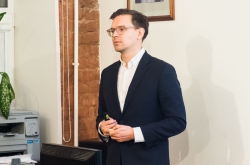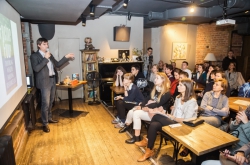Grigory Kunis was the executive director of The St. Petersburg Times and the co-founder and publisher of Moy Rayon newspaper. In 2014, he founded the e-grocery service iGoods.
Our company’s motto is “saving our customers ten days out of a year”. Without having to go to the store, pick their purchases, wait in lines and bring everything home, our customers are free to do other things, like go to the gym, read books, spend time with their kids or just laze on the couch.
Getting people rid of a physical habit is no easy task. Checking the fridge and going to the store has become a part of our muscle memory, something we do subconsciously. Fighting this habit and persuading people to give our service a chance is our most important task.
We've faced many difficulties in this regard. For instance, a lack of trust. A considerable part of our clients are young families with children. Parents find it hard to entrust others with buying their children’s food and such.

On employee relations
We are very scrupulous about training our personnel. Our drivers go through a four hours-long training session. The purchasers have to attend a week-long training course, 12 hours each day. Their training involves knowing how to choose particular products at a supermarket and developing their attention. Most fail during their very first days: many people can't see the necessary products even when they are right under their noses. This kind of work calls for great attention to detail and physical fitness: you have to spend up to 12 hours on foot.
The one piece of advice that I give to all senior managers is to try doing their subordinates' jobs. After spending several days doing deliveries, I began to understand my employees better and found a common language with them. All our senior managers did that.
What would I recommend to my past self? 25 years of working in the media industry taught me one important rule: the most important thing for business is to know how to put together a team. In the media business, forcing people to do their work is pointless. Good journalists enjoy their jobs, not just the money it brings them. You shouldn't try to "break" them. I follow the same approach with my employees, be they programmers, drivers, or purchasers. When they have comfortable working conditions, doing their jobs becomes a pleasure.

I try to persuade our employees to do the right thing, not make them. If they can't do something, you just need to show them what they were doing wrong. Otherwise, they lose motivation.
"Social strokes" play a major role in people's work. After a delivery, clients rate our drivers and purchasers, who can see it in real-time mode. Such feedback shouldn't be underestimated: customers can choose the same purchaser for their future orders. We want to make positive feedback feel truly rewarding. This way, both our clients and employees will be more pleased with the service.
On working with supermarkets
Our clients’ average bill is 3,700 rubles. We don't charge any additional fees for the products; our profits come from delivery services and discounts that our partners offer for wholesale purchases. By the way, securing those bonuses is actually the hardest part of any negotiations.
Making an agreement with the METRO chain was the easiest. In a sense, our service builds on their bulk purchase-centric business model. In four months, we convinced them of the quality of our service and software.
In 2014, most supermarket chains heard our offer and said: "First you go learn the hard way with some other partners, and then come back". The management of the O'key supermarket chain told us they weren't interested from the very beginning, and sometime later, we've learned that they launched their own delivery service.

We are not afraid of such competition. Perekrestok also launched its own delivery service, but what does it matter? Our market is only 1% of all retail, so there's enough space for everyone. I doubt that major IT companies like Yandex and Mail.ru will be able to enter this market without the help of its current players. The work we are engaged in is a lot more complex than doing deliveries from restaurants.
Developing a website for our service was a really interesting experience. In the very beginning, we learned that neither Lenta nor METRO maintain an up-to-date database of their goods and offers. As we were making a website for buying products online, we needed images. Most people rely on visual perception when making choices, so the quality of these images had to be top-notch. So, we did everything by ourselves. Today we have over 88,000 images on our website, and they all look really good. We are now thinking of what else we can do with them: we already get proposals for their use and purchase.
Overcoming crises
The first year was very hard. Our idea was to make a client-oriented project, but we had no clients. We had to fight for every new customer. Our plan was to reach 300 orders a day in six months. In reality, 25 a day was all we could manage. At METRO, they gave us permission to place promoters near counters, we registered new users, sent them notifications, but they still didn't come. After a year, we only got about 35 orders a day. It was most disappointing. Making mistakes would've been alright, but we didn't even get any results to work with.

All businesses took time to develop. My experience from the media industry taught me that you can't get everything at once. You have to "cultivate" your audience. Making people adherents of your newspaper or service is a hard and a meticulous job.
iGoods attained the desired results after our partnership with Lenta. Before that, our only partners were METRO and Prisma, so it seems that we lacked a third major player to win the consumers’ trust. After we offered them some choice, the number of orders started to go up.

As of now, iGoods gets over a thousand orders a day but is still losing money. We decided to greatly invest in IT: we spend over two and a half million rubles a month on new inventions. For example, the eco-friendly bags that we want to use for packaging. We have lots of ideas on improving our service, and our IT team only has 12 members. Four back-end developers, four front-end developers, and the rest are designers and testers.
What's more, after getting new investments we started to develop in Moscow, Kazan, Surgut, Orenburg, and Belgorod. Well, the sky's the limit.




